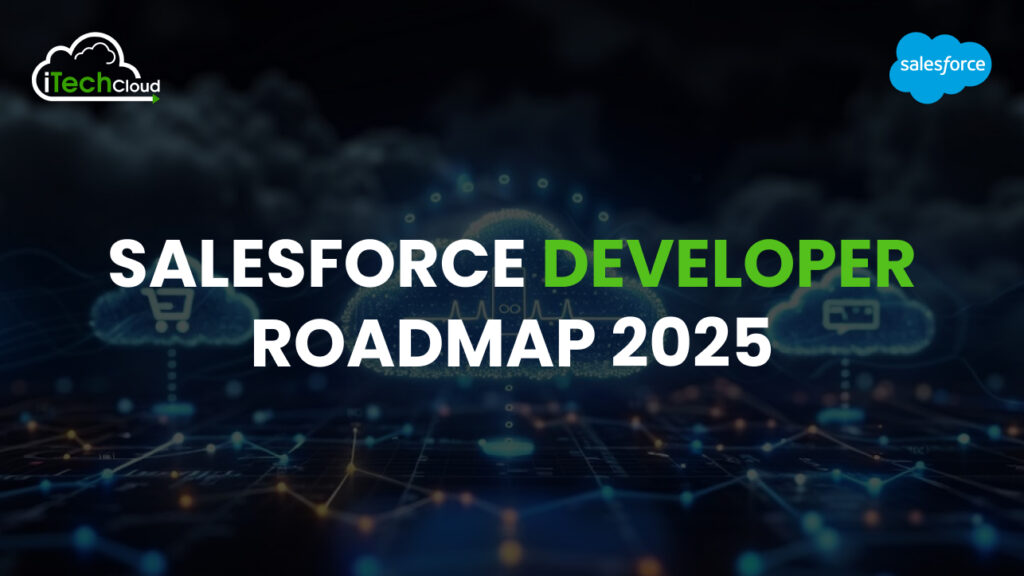Salesforce Developer Roadmap 2025

As we step into 2025, the demand for Salesforce developers continues to grow, driven by the platform’s extensive adoption across industries. Salesforce is not just a customer relationship management (CRM) tool; it is a robust ecosystem that supports businesses in various functions. This roadmap will guide aspiring developers through the essential skills, certifications, and practices necessary to succeed in this dynamic field.
Table of Contents
Why Become a Salesforce Developer?
1. High Demand:
With over 150,000 businesses using Salesforce globally, the need for skilled developers is at an all-time high. The platform is expected to create approximately 9.3 million new jobs by 2026, making it a lucrative career choice.
2. Competitive Salaries:
Salesforce developers can expect salaries ranging from $80,000 to over $150,000 annually, depending on their experience and expertise.
3. Diverse Career Opportunities:
The versatility of Salesforce means developers can work in various sectors, including finance, healthcare, and technology.
Step-by-Step Roadmap to Becoming a Salesforce Developer
Step 1: Understand Salesforce Fundamentals
Before diving into development, grasp the core functionalities of the Salesforce platform. Key areas to focus on include:
- Salesforce Ecosystem: Familiarize yourself with specialized clouds like Sales Cloud, Service Cloud, and Marketing Cloud.
- Trailhead: Utilize Salesforce’s official learning platform for interactive training and hands-on experience.
Step 2: Master Core Development Skills
Salesforce developer, you must master several foundational skills:
- Apex Programming: Learn Apex, Salesforce’s proprietary programming language used for backend development.
- Visualforce and Lightning Web Components (LWC): Understand how to create user interfaces using these technologies.
- SOQL and SOSL: Get comfortable with Salesforce Object Query Language (SOQL) and Salesforce Object Search Language (SOSL) for database queries.
Step 3: Gain Practical Experience
Hands-on experience is crucial for reinforcing your knowledge:
- Build Projects: Create sample applications or contribute to open-source projects to apply your skills in real-world scenarios.
- Internships: Seek internships or entry-level positions to gain industry experience and learn from seasoned professionals.
Step 4: Obtain Relevant Certifications
Certifications enhance your credibility and demonstrate your expertise:
- Salesforce Certified Administrator: A foundational certification that covers essential administrative skills.
- Salesforce Platform Developer I & II: These certifications focus on Apex programming, Visualforce, and advanced development concepts.
Step 5: Explore Advanced Topics
As you progress, delve into more complex areas of Salesforce development:
- Integration Techniques: Learn how to integrate Salesforce with external systems using REST APIs and SOAP APIs.
- DevOps Practices: Familiarize yourself with tools like Git and CI/CD pipelines for efficient deployment processes.
Step 6: Engage with the Community
Continuous learning is vital in the fast-evolving tech landscape:
- Join Forums and Groups: Participate in online forums and local meetups to network with other developers and share knowledge.
- Attend Events: Engage in events like Dreamforce or webinars hosted by Salesforce to stay updated on the latest trends and technologies.
Continuous Learning and Adaptation
The Salesforce ecosystem is ever-changing; thus, staying current is essential. Here are ways to ensure ongoing growth:
- Trailhead Learning Paths: Regularly update your skills through Trailhead’s courses tailored for different expertise levels.
- Follow Industry Trends: Keep an eye on emerging technologies such as AI integration within Salesforce applications.
Conclusion
Salesforce developer in 2025 presents exciting opportunities filled with challenges and rewards. By following this roadmap—understanding the fundamentals, mastering core skills, gaining practical experience, obtaining certifications, exploring advanced topics, and engaging with the community—you will be well-equipped to thrive in one of the most dynamic fields in technology. Consistency in practice and a commitment to continuous learning are key drivers of success in this rewarding career path.

